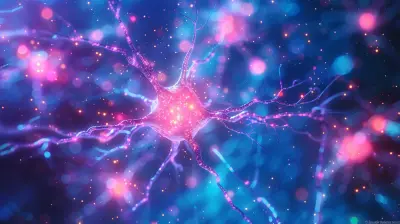How Technology is Affecting Brain Development in Children
7 February 2025
In today’s fast-paced, tech-driven world, it’s nearly impossible to avoid technology. Tablets, smartphones, computers, video games—you name it—children are growing up surrounded by screens. If you’re a parent, educator, or simply someone interested in child development, you might have wondered: How is all this technology affecting brain development in kids?
Our brains are like sponges, especially when we're young. They're constantly growing, absorbing information, and forming new neural connections. But what happens when a large part of that development is shaped by screens? Let's dive into the fascinating relationship between technology and the developing brain of children.

The Digital World: A Double-Edged Sword
Technology can be a game-changer for kids, opening up a world of learning, entertainment, and creativity. But like most things, it has its pros and cons. Yes, kids can learn to problem-solve, improve hand-eye coordination, and even pick up new skills like coding. But prolonged exposure to screens and digital content can also have some negative effects on their brain development.So, is technology a friend or foe in the world of child development? The answer isn't black and white—it depends on how it's used, the type of content, and the amount of time spent on it.

How Much is Too Much?
Before diving into the science, let’s address the elephant in the room: screen time. How much is too much? According to the American Academy of Pediatrics, children aged 2 to 5 should have no more than one hour of screen time per day, and for children aged 6 and older, parents should establish consistent limits to ensure it doesn’t interfere with sleep, physical activity, or other essential behaviors.But let’s be honest. In the real world, kids often spend way more than that glued to a screen. Digital devices have become the new babysitter, and it's not uncommon to see a toddler expertly swiping through a tablet like a mini tech genius. The big question is, what’s happening inside their brains during all this screen time?

The Impact of Technology on Different Parts of the Brain
The human brain is an incredibly complex organ, and technology can affect various areas of brain development in both positive and negative ways. Let’s break it down:1. Attention Span and Focus
Have you ever noticed that kids seem to have the attention span of a goldfish these days? That’s not an accident. Studies suggest that overexposure to fast-paced digital content—think YouTube videos, video games, and social media—can shorten attention spans. Children may find it harder to focus on slower, more thoughtful tasks like reading a book or working on a puzzle.When children consume quick bursts of information or constantly switch from one app to another, their brains adapt to this new way of processing information. Unfortunately, this can make it more difficult for them to concentrate on tasks that require sustained attention.
The Science Behind It
The brain has a system called the dopaminergic pathway, which is responsible for reward and pleasure. Fast-paced, interactive tech like video games and social media provide constant dopamine hits. Over time, kids’ brains may become wired to crave the instant gratification that technology provides, making it harder to focus on tasks that require patience and deep concentration.2. Memory and Learning
Technology can be a double-edged sword when it comes to memory and learning. On the one hand, educational apps, documentaries, and websites provide a treasure trove of knowledge. But on the flip side, multitasking—a behavior many children engage in when using technology—can impair memory retention.When kids are multitasking, whether it's texting while doing homework or watching TV while playing a game, they’re not fully engaging with any single task. The brain can struggle to retain information because it’s spread too thin. Think of the brain like a filing cabinet: if you're constantly stuffing in papers without organizing them, things get lost.
Deep vs. Shallow Learning
Another concern is that technology encourages shallow learning—quickly skimming through information rather than deeply engaging with it. Reading a book, for example, encourages deep cognitive processing. In contrast, scrolling through social media provides quick snippets of information without requiring much thought. Over time, this can limit a child’s ability to deeply process and understand complex concepts.3. Social Skills and Emotional Development
It’s ironic, but even though kids are more "connected" than ever, they might be missing out on some essential social skills. Face-to-face interactions are crucial for developing social and emotional intelligence, and too much screen time can interfere with this.Kids who spend excessive time on digital devices may struggle with interpreting non-verbal cues like body language, tone of voice, or facial expressions. This can make it harder for them to form and maintain real-life relationships. In extreme cases, children may even develop social anxiety because they’re more comfortable interacting online than in person.
The Rise of "Virtual Playgrounds"
Back in the day, kids played outside, engaged in imaginary play, and interacted with peers in a physical environment. Today, many children are spending their free time in "virtual playgrounds" like online games or social media platforms. While these environments can foster creativity and teamwork, they lack the richness of real-world interactions, which are essential for developing empathy and emotional intelligence.4. Cognitive Development and Problem-Solving
On the plus side, technology can enhance certain aspects of cognitive development. Video games, for instance, often require quick thinking, decision-making, and strategic planning. Some games even promote creativity and problem-solving skills by challenging kids to navigate complex scenarios or build virtual worlds.However, not all digital content is created equal. Passive consumption, like binge-watching TV shows or endlessly scrolling through social media, does little to stimulate the brain. While interactive and educational content can boost cognitive development, too much passive screen time can have the opposite effect.

The Role of Parents in Balancing Technology Use
As with most things in life, balance is key. Parents play a critical role in helping children develop a healthy relationship with technology. Here are some practical tips for managing your child’s tech use:1. Set Limits on Screen Time
It’s essential to establish clear rules around screen time. For younger children, stick to the one-hour-per-day guideline, and for older kids, create a schedule that prioritizes homework, outdoor play, and family time over screen use. Consider using apps or built-in device features to monitor and limit screen time.2. Encourage Quality Over Quantity
Not all screen time is created equal. Encourage your kids to engage in educational and interactive content rather than passive consumption. Look for apps, games, and shows that promote creativity, problem-solving, and learning. For example, coding apps can teach kids valuable skills while keeping them engaged.3. Model Healthy Tech Habits
Kids often mimic their parents, so make sure you’re setting a good example. If you’re constantly glued to your phone, your child is likely to follow suit. Try to be mindful of your tech habits and set aside screen-free time as a family—for example, during dinner or before bed.4. Promote Offline Activities
Encourage your children to engage in offline activities like reading, playing outside, or participating in hobbies. By diversifying their experiences, you’re helping them develop a range of skills and cognitive abilities that technology alone cannot provide.Conclusion: Technology—A Tool, Not a Substitute
There’s no denying that technology is here to stay, and when used correctly, it can be a powerful tool for learning and development. However, like any tool, it should be used in moderation and with purpose. Too much screen time can have negative effects on attention span, memory, social skills, and emotional development, while high-quality, interactive content can enhance cognitive skills and problem-solving abilities.The key takeaway? Technology should complement, not replace, real-world experiences. Encourage your children to explore the world around them, engage in meaningful social interactions, and use technology as a tool to enhance their growth—not as a substitute for it.
all images in this post were generated using AI tools
Category:
NeuroscienceAuthor:

Eliana Burton
Discussion
rate this article
10 comments
Orionyx Kline
This article provides essential insights into the complex relationship between technology use and brain development in children. Understanding these effects is crucial for parents and educators to foster healthy cognitive growth in an increasingly digital world.
April 4, 2025 at 4:26 PM

Eliana Burton
Thank you for your thoughtful comment! I'm glad you found the insights valuable for supporting children's cognitive growth in our digital age.
Spencer Clayton
Technology's impact on child brain development warrants close examination.
March 25, 2025 at 3:53 PM

Eliana Burton
I completely agree! Understanding technology's role in child brain development is crucial for ensuring healthy growth and learning.
Arlo McDowell
This article raises fascinating points about technology’s impact on children's brain development. It’s intriguing to consider both the potential benefits and challenges that arise from tech exposure. I’m eager to explore how we can balance these influences for healthier cognitive growth in young minds.
March 2, 2025 at 5:40 AM

Eliana Burton
Thank you for your insights! It’s crucial to find that balance to harness technology’s benefits while mitigating its challenges for our children's cognitive health.
Elwynn Frank
This article sheds light on a crucial topic! Understanding technology's impact on children's brain development is vital for fostering healthy habits. Let's empower ourselves to create environments that nurture their growth both online and offline. Great insights!
February 22, 2025 at 6:01 AM

Eliana Burton
Thank you for your thoughtful comment! I'm glad you found the insights valuable—creating a balanced environment for children is indeed essential.
Delilah Morales
This insightful article highlights the dual impact of technology on children's brain development, emphasizing both cognitive benefits and potential risks. Understanding these effects is crucial for parents and educators to foster healthier tech use.
February 21, 2025 at 5:04 PM

Eliana Burton
Thank you for your insightful comment! I'm glad you found the article valuable in highlighting the complexities of technology's impact on children's brain development.
Quentin Kearns
The article highlights the complex relationship between technology use and brain development in children. It emphasizes the need for balanced engagement with digital devices, as excessive screen time may hinder cognitive and social skills. Parents and educators should promote healthy technology habits to support optimal development.
February 20, 2025 at 5:16 PM

Eliana Burton
Thank you for your insightful comment! I completely agree that fostering balanced technology use is crucial for children's cognitive and social development.
Eliza Green
This article highlights such an important issue! As a parent, I’m constantly amazed at how technology shapes my child's mind—both the benefits and challenges it brings.
February 18, 2025 at 4:23 AM

Eliana Burton
Thank you for your thoughtful comment! It's crucial to recognize both the positive and negative impacts of technology on children's development. Your perspective as a parent adds valuable insight to this conversation.
Beth McWhorter
This article presents a crucial topic in today's digital age. While technology offers many benefits, it's essential to consider its potential drawbacks on children's brain development. Parents and educators must be mindful of screen time and encourage balanced activities for healthier growth.
February 16, 2025 at 4:39 PM

Eliana Burton
Thank you for your insightful comment! I completely agree that balancing technology use is vital for children's healthy brain development.
Lola Sheppard
This article highlights vital insights on technology's dual role in shaping children's brain development—stimulating growth while also posing significant risks to attention and behavior.
February 15, 2025 at 4:36 AM

Eliana Burton
Thank you for your insightful comment! It's essential to recognize both the benefits and challenges technology presents in children's brain development.
Anna Vasquez
Great insights! It’s crucial to balance technology use with other activities to support healthy brain development in children. Keep sharing!
February 7, 2025 at 4:10 AM

Eliana Burton
Thank you! I appreciate your support and completely agree about the importance of balance for healthy development.
MORE POSTS

How Multitasking Affects Brain Efficiency and Focus

Exploring the Impact of Childhood Experiences on Adult Behavior

The Importance of Emotional Healing for Personal Growth

How Holistic Therapy Approaches Can Enhance Mental and Emotional Well-Being

The Role of Dopamine in Reward and Motivation

The Shadow Self: Understanding Repressed Desires and Fears

How Different Cultures Approach Grief and Mourning